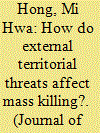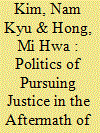| Srl | Item |
| 1 |
ID:
167280


|
|
|
|
|
| Summary/Abstract |
The current scholarship on mass killing demonstrates that genocide and other forms of mass murder are usually policy responses to threats, emphasizing armed conflict and political upheaval, such as revolution, as important causal factors. However, scholars have so far had little to say about the relationship between a country’s external threat environment and mass killing. We argue that a country’s external security environment, particularly when its neighbors pose threats to its territorial integrity, is a critical and understudied factor shaping a leader’s decision to employ mass killing. External territorial threats can produce domestic in-group/out-group dynamics, heightening fears that some domestic groups may be supporting or colluding with the enemy. Yet, given the availability of alternative policies and the enormous costs of mass killing, territorial threats alone do not suffice to explain why a state chooses mass killing over other types of violent or nonviolent strategies. Only when leaders are committed to exclusionary ideologies, are territorial threats more likely to catalyze hatred and fear of domestic out-groups, increasing a leader’s willingness to direct massive violence against them. Such leaders are more likely to frame domestic out-groups as inherently threatening and as enemies to be eliminated. Our empirical analysis reveals that a country’s territorial threat, measured by either territorial rivalries or territorial claims, is associated with a greater likelihood of mass killing onset only when leaders hold exclusionary ideologies.
|
|
|
|
|
|
|
|
|
|
|
|
|
|
|
|
| 2 |
ID:
165883


|
|
|
|
|
| Summary/Abstract |
Why do some states pursue transitional justice (TJ) in the immediate aftermath of armed conflict while others do not? What drives a state to select a particular type of justice mechanism over another? Building on the political explanations of TJ, we argue that postconflict justice (PCJ) decisions are driven by the interests and power of political elites shaped by recently ended conflicts. Our empirical analysis shows that conflict outcomes and their subsequent impact on the balance of power between the government and rebel groups are the most important determinants of PCJ decisions. Domestic trials are most likely to emerge out of a decisive, one-sided victory while truth commissions and reparations are most likely to occur after a negotiated settlement. We also find that conflict severity interacts with conflict outcomes to affect PCJ decisions.
|
|
|
|
|
|
|
|
|
|
|
|
|
|
|
|